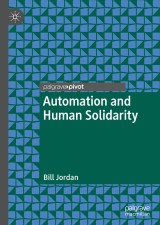Details

Automation and Human Solidarity
|
CHF 65.00 |
|
| Verlag: | Palgrave Pivot |
| Format: | |
| Veröffentl.: | 25.01.2020 |
| ISBN/EAN: | 9783030369590 |
| Sprache: | englisch |
Dieses eBook enthält ein Wasserzeichen.
Beschreibungen
<p>This book provides a detailed analysis of the economic and political implications of the introduction of Artificial Intelligence and Robotics into the service sector of economies that have so far relied on service jobs to sustain levels of employment. It examines how reliance on coercive measures for enforcing low-paid service work attempts to postpone this third Industrial Revolution, and analyses the struggles that must still take place if we are to achieve a future of freedom and social justice for all. While automation and globalisation have made human solidarities of traditional kinds more difficult to sustain, they have also made new kinds possible. Experiments in social policy, and especially the pilot projects with unconditional Universal Basic Incomes, offer a possible model for a new kind of society. The author argues that it is politics which will determine whether we can achieve these new human solidarities.</p>
Chapter 1. Introduction.- Chapter 2. Automation.- Chapter 3. Individualism and Solidarity.- Chapter 4. The Origins of Co-operation and Conflict.- Chapter 5. Nature and Science.- Chapter 6. Moral Regulation.- Chapter 7. Democracy, Communities and Interdependence.- Chapter 8. Globalisation.- Chapter 9. Conclusion.
<div><b>Bill Jordan</b> is Honorary Professor of Social Policy and Social Work at the University of Plymouth, UK. He has authored more than 25 books on politics, economic and social policy, social work and migration, including <i>Authoritarianism and How to Counter It </i>(2020) and <i>The Age of Disintegration</i> (2020). He held visiting professorships in the Netherlands, Denmark, Germany, Slovakia, Hungary and the Czech Republic.</div><div><br></div>
This book provides a detailed analysis of the economic and political implications of the introduction of Artificial Intelligence and Robotics into the service sector of economies that have so far relied on service jobs to sustain levels of employment. It examines how reliance on coercive measures for enforcing low-paid service work attempts to postpone this third Industrial Revolution, and analyses the struggles that must still take place if we are to achieve a future of freedom and social justice for all. While automation and globalisation have made human solidarities of traditional kinds more difficult to sustain, they have also made new kinds possible. Experiments in social policy, and especially the pilot projects with unconditional Universal Basic Incomes, offer a possible model for a new kind of society. The author argues that it is politics which will determine whether we can achieve these new human solidarities.<div><b><br></b></div><div><b>Bill Jordan</b> is Honorary Professor of Social Policy and Social Work at the University of Plymouth, UK. He has authored more than 25 books on politics, economic and social policy, social work and migration. He held visiting professorships in the Netherlands, Denmark, Germany, Slovakia, Hungary and the Czech Republic.</div>
Bridges all the social science disciplines Argues that it's a big mistake to imagine that technology itself – whatever its potential for liberation – will actually lead to freedom for workers Goes beyond utopian or dystopian views of new technologies

















